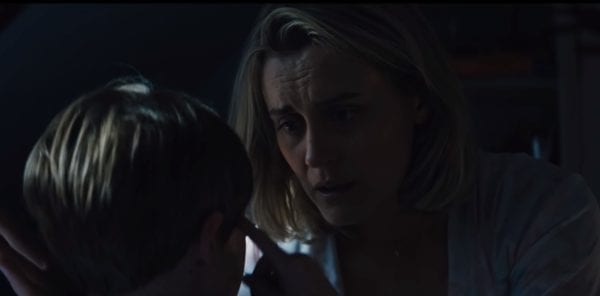The Prodigy, 2019.
Directed by Nicholas McCarthy.
Starring Taylor Schilling, Brittany Allen, Jackson Robert Scott, Colm Feore, Peter Mooney, and Paul Fauteux.
SYNOPSIS:
A mother concerned about her young son’s disturbing behavior thinks something supernatural may be affecting him.

Note to filmmakers, marketers, or whoever’s responsible for posting trivia on IMDb – avoid bragging about dumbing scares down in your horror movie pre-release. Never, ever, under any circumstances. In the case of Nicholas McCarthy’s The Prodigy, factoid numero uno reads like this: “The now infamous scene at the end of the first trailer, along with other scenes, had to be re-edited for test audiences due to their intense scare factor.” Horror fans salivate over a ruinous scream, so confirmation that punches were indeed pulled is a terrible look – especially when your movie ain’t that scary after all.
Taylor Schilling plays Sarah, partner of John (Peter Mooney), and first-time mother to son Miles. As her baby boy grows, Miles is singled out as a gifted “smartypants” who needs “special” aka more challenging education. By the time he’s eight, Miles (Jackson Robert Scott) is asking to use flavoring spices like Paprika instead of dousing chicken fingers in ketchup, but Sarah’s angel soon starts violently lashing out. Then out-of-body talk starts, followed by hypnotically speaking in unidentifiable languages. Sarah and John begin to worry, afraid there’s something systematically wrong with their baby. Unfortunately, they can’t even assume the half of it.

McCarthy’s signature is housebound horrors. The Pact and At The Devil’s Door pan around dimly-lit chambers, blackened hallways, and down creaky staircases as the best manipulators of architecture can. The Prodigy is no different when calling out Sarah’s 2AM lurking as to not wake Miles or babysitter Zoe’s (Elisa Moolecherry) basement “accident.” Darkness an ally of McCarthy’s; an enemy of audience nerves (direct homage to Mario Bava’s Shock). Moody trademarks reflect the filmmaker’s astute interpretation of shadow-based horror, but Miles’ precarious and unnerving “kids be creepy” vibe doesn’t always require said terrorization. Hence where trauma devolves into a more generic exemplification of plot devices fans have seen before.
Intrigue weaves through Jeff Buhler’s screenplay. You see, reincarnation is widely accepted in Eastern cultures, like – say, hypothetically – a small Hungarian farming town near the Romanian border with a dialect spoken by only 40K citizens worldwide. This idea that souls return to Earth after their bodily vessel fades due to unfinished business. McCarthy is tasked with presenting said scenario in a young boy’s body, balancing the believable – Miles is just a mentally advanced youth with cognitive differences – and bizarre – the soul of a vanquished serial killer is attempting to gain control of Miles’ body. Sometimes this works! Sometimes it does not.
Jackson Robert Scott plays the part of a sweater-clad *maybe* Ohio woman slayer well – muttering “gibberish” in his sleep or seductively caressing mama Sarah in sexually disturbing ways – but his parental counterparts struggle with motivation. Specifically, Peter Mooney as John. Haunted by his own abused upbringing, his choices favor dramatization and ill-consequences. Why flee his family the *first* time he grows upset with Miles (daddy needs to cool down)? Why reveal his asylum plan – like a third-rate Bond villain – to Miles when most vulnerable (driving)? We’re asked to separate “killer from boy” and view Miles as if we’re John or Sarah – our kin – as to suggest decision making would suffer due to bloodline connections.
In that respect, The Prodigy feels like a pre-2010s familial nightmare along the lines of Orphan or The Children except without daring scripted twists or a sense of freshness amidst despicable dysfunction.
Buhler and McCarthy lean on too many crutches like John’s mid-drive monologue above. Lovers of canines, shield your eyes from The Prodigy’s furry pawn sacrifice (can we stop with this trope). Schilling bursts with sacrificial maternal instincts that fight her ability to comprehend Miles’ increasingly dangerous personality, but still makes excuses for her child’s strange behavior. Every scene treats Miles with the presence of a bodybuilder, adults fearful around him, despite his unimposing body. Hypnosis, Heterochromia, Miles’ beating of a classmate with a wrench – all these underplayed values lead to a “shocking” finale that sets to define your enjoyment of the (rather generic) proceedings.

Truthfully, this reviewer believes by going the way of the *wrong* gun (you’ll understand after seeing), Buhler picks the more obvious gut-punch despite harrowing impact.
There’s a lot to say about The Prodigy regarding how pure evil can destroy a perfect household – that removal of safety where it’s most expect – and parenting fears realized through the most despicable, unsightly means. Innocence lost, demonism found. Nicholas McCarthy knows his way around boogeyman tension (in this case, Miles could be anywhere), but recycled character mapping and a lack of genuine scares make Miles’ serial-killer-in-training schtick a simmer that never boils over. Blurry figures lurk, skeleton Halloween costumes chill, but even with an ending that’ll leave some audiences slackjawed, there exists an all-too-familiar sense of “seen it before.” If anything, at least we know Taylor Schilling deserves more future horror roles?
Flickering Myth Rating – Film: ★ ★ ★ / Movie: ★ ★
Matt spends his after-work hours posting nonsense on the internet instead of sleeping like a normal human. He seems like a pretty cool guy, but don’t feed him after midnight just to be safe (beers are allowed/encouraged). Follow him on Twitter/Instagram/Letterboxd (@DoNatoBomb).












